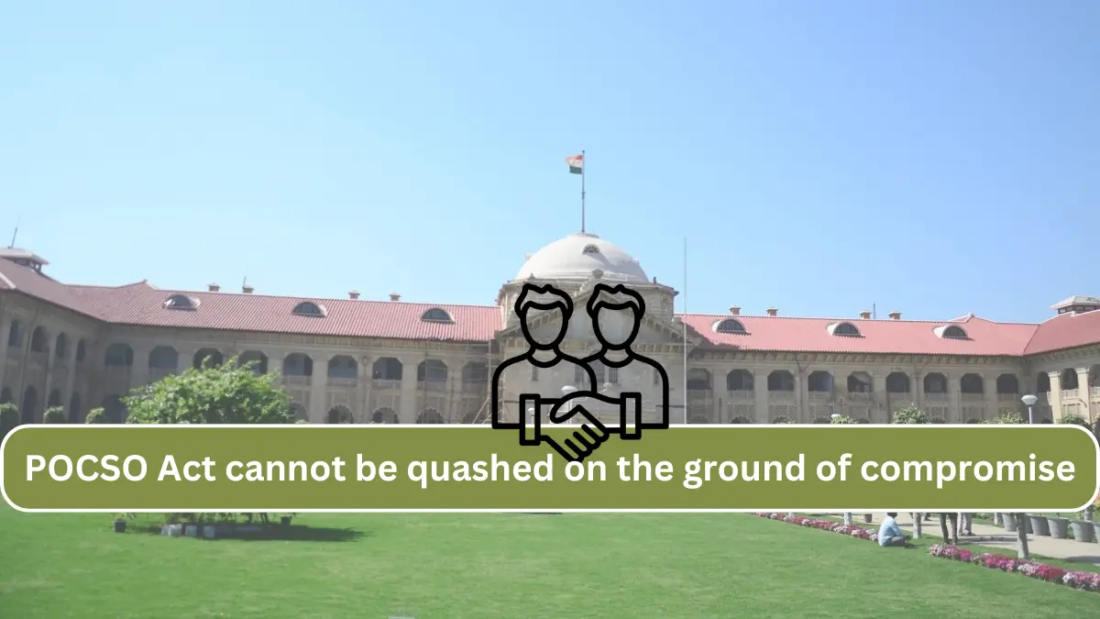Background of the case
The Petitioner (Accused) filed an application under Section 482 CrPC to quash the proceedings pending against him under the POCSO Act on the grounds of compromise reached between the minor prosecutrix and the petitioner.
Contentions of the Petitioner (Accused)
The Petitioner argued before the Hon’ble Court that after lodging the FIR, conclusion of investigation and summoning the petitioner before the trial court for offences under Section 376, 313 IPC and Sections 3/4 of POCSO Act, the accused and the victim/prosecutrix had entered into a compromise based on mutually accepted terms between the parties.
The Counsel for the Petitioner (Accused) cited Fakre Alam @ Shozil vs State of U.P and 3 others and argued that the Court in the referred case filed under Sections 363, 366, 376, 506 IPC and Sec 6 of POCSO Act had exercised its powers and quashed the proceedings thus, the present case was also eligible to be quashed.
Contentions of the Prosecution/State
Counsel for the Prosecution/State opposed the prayer of the Petitioner (Accused) and highlighted the date of birth of the victim and the date of the alleged incident to argue that the victim was a minor aged about 15 years at the time of the incident and a prima facie case was made out against the Accused/petitioner. Additionally, the State asserted that a plea to quash the order based on a compromise, cannot be entertained in a case of this nature.
Analysis of the Court
The Court while deciding the present application looked at several precedents to decide the following issues:
- Whether the Court can exercise its power under Section 482 when a compromise has been reached between the parties?
- Whether the Court can quash the proceedings in the nature of the present case on the ground of compromise between the minor prosecutrix and the petitioner?
The Court referred to the decisions of the Apex Court in Narinder Singh Vs. State of Punjab: (2014) 6 SCC 466 and Gian Singh Vs. State of Punjab: (2012) 10 SCC 330 to highlight the following principles:
- The power of the Court under Section 482 CrPC is an inherent power which can be attracted even if the offence is non-compoundable.
- The power under Section 482 CrPC has to be exercised sparingly and with caution.
- This power cannot be exercised in cases involving “heinous and serious offences of mental depravity or offences like murder, rape, dacoity, etc. Such offences are not private in nature and have a serious impact on society.”
- The Court is under an obligation to look at the nature and gravity of an offence while deciding on an application for quashing FIR on the ground of a compromise.
Additionally, the Court observed that since the victim/prosecutrix was below 18 years of age, her consent would be immaterial for all stages of the case, including for a compromise. The mere agreement of the minor prosecutrix to enter into a compromise with the Petitioner (Accused) would not be sufficient rationale to quash the proceedings. While consent is material under Section 375 of IPC, under sections 3 and 4 of POCSO Act, the prosecution of the Accused cannot be quashed merely on the basis of compromise.
Observation of the Court
The Court cited the decision of the Apex Court in State of Madhya Pradesh Vs. Madanlal: (2015) 7 SCC 681 to highlight the gravity of the offences filed against the Petitioner (Accused).
The Court in the above case had observed that “…..in a case of rape or attempt to rape, the conception of compromise under no circumstances can really be thought of.….Dignity of a woman is a part of her non-perishable and immortal self and no one should ever think of painting it in clay. There cannot be a compromise or settlement as it would be against her honour which matters the most. It is sacrosanct.”
The Court further relied on its judgment to emphasize that permitting any form of liberal approach or mediation in such cases would be beyond legal permissibility and against the honor of a woman.
Decision of the Court
On the basis of the abovementioned precedents and legal principles, the Court dismissed the application filed by the Petitioner/Accused under Section 482 CrPC.
-By Adv. Tusharika Vig
 Cart is empty
Cart is empty 

